#global success club
Text
Proposed logging project in the Daniel Boone National Forest (South-Central Kentucky, USA)
I found out about this recently and Ive seen barely any discussion or attention about it in real life or on the internet, so hopefully I can attract more attention
The USA Forest Service is planning to log 10,000 acres of the Daniel Boone National Forest near Jellico Mountain, near the Kentucky-Tennessee border. The plan includes around 1,000 acres of clear cutting.
We need mature forests to remove and store carbon from the atmosphere. This is disastrous from a climate change perspective.
The excuse being given (apart from the obvious economic incentive of logging) is that the tract is mostly "mature forest" and that the forest needs to have a "diversity of age classes" for wildlife. This is total bullshit, since less than 1% of old growth forest in the Eastern USA remains, and an 80-year-old forest is still incredibly young. This type of reasoning is greenwashing.
To make matters worse, the planned logging is on mountain tops, which will cause huge amounts of erosion and possible floods and landslides that endanger the people who live in the valleys below.
Kentucky experienced a deadly flash flood in the eastern mountains that killed 40 people last year. Forests help stop flash flooding by absorbing rainfall in a dense layer of roots and soil, draining it slowly into waterways; without them, mud and rainwater goes rushing straight into narrow mountain gullies rapidly, causing dangerous floods.
Mud and sediment rushing into streams also kills fish and aquatic life that need clear, clean stream water.
Kentucky has one of the most biodiverse freshwater ecosystems in the entire world, with only a couple states next to it having more freshwater species. Kentucky's forest streams have fresh water fish, crustaceans and other species found nowhere else on Earth.
The Southeastern USA has the most diverse freshwater life of any place on Earth, the most salamander diversity of any place on Earth, and the Appalachian Mountains are a global hotspot of biodiversity, considered one of the world's most biodiverse temperate deciduous forest habitats.
It is crucial that we begin building the old-growth forests of the future NOW!
Logging these forest tracts will facilitate invasive species to take over. Mature forests form buffer zones against invasive species. The forest will never grow back the way it was; it will be infected with Kudzu, Autumn Olive, Honeysuckle and other invasives that take advantage of the destruction and prevent the normal process of forest succession from happening as it should.
If you live anywhere near this area, talk to everyone around you about this, send them the links above and encourage them to do the same themselves.
Talk to your friends, your neighbors, people at your church, everyone you are in contact with or speak to in your day to day life. Tell them about the risks of flash flooding and landslides and the importance of preserving mature forest land. Any environmental clubs and organizations you know of, tell them as well.
Most people haven't even heard this is happening, and that's how they get away with it.
Public outrage protects priceless habitats all the time, so TELL EVERYONE YOU KNOW. Tell people you don't know, even. Call and email organizations and people that might be interested, until you run into someone who has an idea of what to do. That's how change happens!
1K notes
·
View notes
Photo

Since I’m brand new to tumblr and definitely never used the service before, here are some facts about me:
1. My favorite taste is coffee--specifically Awesome Coffee Club coffee. We source the best beans directly from farmers’ collectives in Colombia, roast them to a light or medium-dark perfection (your choice!) and then send coffee beans to you. And best of all, 100% of the profits go to charity. The Awesome Coffee Club and its sibling the Awesome Socks Club donated over two million dollars this year to radically reduce maternal mortality in Sierra Leone, which is the current epicenter of the global maternal mortality crisis. You can learn more at http://awesomecoffeeclub.com.
2. I am a coffee company, not a human being. Human beings are so frail! They have so many feelings! Sometimes they get their feelings hurt and react defensively, which only makes life worse for them and for others! Fortunately I do not have these problems, because I am not a person; I am a coffee company that donates its profit to charity.
3. Most coffee companies make billionaires richer. What a bad idea! Billionaires are already rich! Why would they need more money??? Our coffee company does not make any billionaires richer, but it does play the salaries of many community healthworkers who identify high-risk pregnancies in their communities.
4. Because I am new to tumblr and have absolutely never been here before, I have a lot to learn. So let me know if you have tips and tricks for being a successful coffee company on tumblr. Once again that link is http://awesomecoffeeclub.com
2K notes
·
View notes
Text
How to create a reputation for yourself
In a very competitive world where resources are scarce and opportunities are too little, being able to stand out will get you further ahead.
Create a signature for yourself: I go to a very small undergrad school so I tend to cross paths with the same students/professors which makes me easily recognizable. My signature is that I sit at the front row of every class. Professor A came to my class to give a quick lecture on the importance of globalization in professor B's class (both are my professors) and they both joked about how I always sit at the front which makes it easy to spot me. I also ask questions, give commentaries, or say my observations. In that situation I am building the reputation of an engaged student even though I may not be the smartest one in the room and that helps to get recommendation letters from professors
Build networks with others: People make the mistake of thinking that networking is only with employers and that is so wrong. Being able to have conversations about your major, your background and your hobbies makes it easier to form connections with successful students. I may be competitive in class but outside of class I am forming study groups, workout groups, career groups because I know this is one of the best ways to build relationships thereby create a reputation for myself. My colleagues are presidents of clubs and sometimes they are the ones who interview me for leadership positions and because they can tell by my performance in and out of the classroom, I am easily favored.
Take advantage of any opportunity to lead: Agree to work on the project, agree to do the presentation, agree to speak for the class if no one else has the confidence to do so. In that way, you are building confidence and a strong reputation with your professors and students. This happened to me last week, no one in class stood up to make a presentation to our guest speaker on the current project we were working on. So, I stood up afraid and I went to the front and pushed through it. Even though I felt I did not do my best, I got recognized by the guest and he asked that I sent my resume for opportunities in his company. Do it afraid and build that reputation for yourself. You'd be surprised by who's watching.
Thanks!
#self improvement#mindfulness#growth#self development#self love#beauty#education#classy#classic academia#educateyourself#books and reading#school#self control#students#smart#self worth#self help#emotional intelligence#educators#booklover#success#mindset#mind control#motivation
2K notes
·
View notes
Text
Planets in the 11th house
The Eleventh House, often called the House of Friends, highlights the strength we find in connections. It's about the power of groups, clubs, and organizations that shape our lives. Within these circles, we discover our potential and grow into our true selves. This house also resonates with our dreams and hopes. It encourages us to envision and work towards our best selves. In the Eleventh House, Aquarius, Saturn, and Uranus reign.
The Sun: in the 11th house fuels a drive for elevating group goals, often leading you to influential friendships and a leadership role within communities. Your open-minded and responsible approach aims for positive change, driven by a desire to empower and uplift. Embrace your social influence, using it to make a meaningful impact on the world around you.
The Moon: in the 11th house often brings female friendships and a sense of security through group belonging. Your nurturing instincts find expression in humanitarian pursuits, valuing collective well-being over personal gain. Working for the group's benefit is fulfilling, driven by your empathy and responsiveness to others. Within your career, friendships play a crucial role, shaping opportunities and enduring beyond tasks. Prioritize a sense of belonging to nurture your emotional well-being, guarding against detachment from your feelings.
Mercury: in the 11th House bestows an ingenious, adaptable, and intellectual mind. Achievement revolves around mental prowess. Friendships, especially with younger individuals or diverse perspectives, energize you. You thrive as a communicator within groups, perhaps as a spokesperson or secretary. Your innovative problem-solving talents shine, but seeking intellectual nourishment from your community remains vital for your growth.
Venus: in the 11th House, your friendly and tactful nature attracts a circle of helpful friends. While your nurturing spirit enhances connections, ensure self-care isn't compromised. You radiate grace in group settings, enjoying diverse activities and fostering ease. Your allure for the unique draws you to like-minded souls, creating a harmonious social presence.
Mars: in the 11th House ignites strong desires and leadership qualities, magnetizing energetic and enterprising friendships. Use caution in choosing the right companions, as you may give too much or inadvertently exploit. Active engagement in group pursuits suits you, inclining towards leadership roles. Your loyal and dynamic nature often makes you the go-to friend, embodying the role of the supportive leader within your circle.
Jupiter: in the 11th House, you thrive through social networks and group dynamics, finding success in business and leadership roles. Your charisma and global outlook make you a natural influencer. While your altruistic drive is commendable, keep aspirations within reach, allowing your positive impact to flourish among friends and the community.
Saturn: in the 11th House brings enduring acquaintances and a sense of duty to purposeful groups. You're drawn to serious connections and work diligently for collective goals, often with limited personal recognition. Patience and hard work lead to later rewards. While feeling distinct might bring challenges, value your unique essence without isolating yourself. Prioritize quality over quantity, nurturing close bonds while overcoming the fear of exclusion.
Uranus: in the 11th House signifies intuitive originality and a strong creative streak, driven by humanitarian ideals. Unconventional friendships with like-minded individuals are common, though you may seem aloof at times. Your rebellious spirit and reformative tendencies stand out, advocating constructive change. Embrace your unique essence, attracting those who resonate with your radical perspectives. Your path is meant to diverge from the ordinary, inspiring transformation.
Neptune: in the 11th House can blur boundaries between self and group, seeking acceptance and compassion within collective ideals. While enjoying group immersion, remember the distinct energy it holds. Your dual nature lets you perceive hidden dynamics, even amid the allure of unity. Empathy guides you, understanding the fine balance between individuality and collective purpose. Cultivate healthy boundaries to avoid being exploited while staying true to your compassionate connections.
Pluto: in the 11th House grants keen awareness of power dynamics within groups, triggering a cautious approach. Sensing motivations and avoiding exploitation becomes second nature. While this can be draining, it shapes a close-knit circle of trusted friends. You may shy away from institutions or new acquaintances due to trust issues. Reconnect with your heart, embrace your uniqueness, and nurture genuine connections that rekindle your spirit.
#astro observations#astro community#astro placements#astrology#all signs#astro notes#for you#asteroid#zodiac placements#astrologer
585 notes
·
View notes
Text
by Ben Cohen
South African Jews reacted with outrage on Friday after the country’s governing body for the sport of cricket stripped the Jewish captain of the U-19 national team of his role, citing the “risk of conflict or even violence” as the reason.
Cricket South Africa (CSA) announced that David Teeger, who is Jewish, would no longer captain the side just one week before the opening of the U-19 Cricket World Cup, when teams from 16 nations will compete in South Africa for the sport’s top prize.
In a statement released on Friday, CSA said that its security team had advised “that protests related to the war in Gaza can be anticipated at the venues for the tournament.”
It added that such protests would likely focus on Teeger — an observant Jew and resident of Johannesburg who made his professional cricket debut in 2023, scoring an impressive 51 runs for the South Africa Emerging Players side against North Cape. Teeger was only appointed to the captaincy of the U-19 team last month.
The targeting of Teeger could result “in conflict or even violence between rival groups of protestors,” CSA said. Invoking its “duty to safeguard the interests and safety of all those involved in the World Cup,” it said that Teeger had been “relieved of the captaincy … in the best interests of the players, the U-19 team, and David himself.” Teeger would “remain an important and active member of the team and we wish him and the team every success in the tournament,” CSA concluded.
CSA’s decision — against the background of rising antisemitism in South Africa, widespread support for Hamas in the wake of its Oct. 7 pogrom in Israel, and the charge of “genocide” brought by South Africa against Israel at the International Court of Justice (ICJ) — provoked fury in South Africa’s Jewish community.
Prof. Karen Milner, chair of the South African Jewish Board of Deputies (SAJBD), told The Algemeiner that CSA’s decision was “an outrageous act of antisemitism.”
“There is no basis for this decision, other than the fact that Teeger is Jewish,” Milner said. “It is shameful that CSA is embarking on a path that is dangerously reminiscent of Nazi Germany, when Jews were actively discriminated against, including among sporting clubs.” She stressed that the SAJBD “would do everything in its power to fight against this vicious prejudice.”
In a separate statement, the South African Zionist Federation (SAZF) said it would be calling on the International Cricket Council (ICC), the sport’s global governing body, “to investigate the CSA’s blatant act of discrimination.”
“The ANC [ruling African National Congress] government’s political hostility to Israel and its friendship with Hamas has created a climate in which it is entirely acceptable to target a sportsman because he is proudly Jewish,” the SAZF stated.
Among those expressing sympathy for Teeger on social media was three-time MLB All-Star Kevin Youkilis. “Heart goes out to this young Jewish man,” Youkilis posted on X/Twitter. “The ‘security risk’ excuse is bullshit.”
Former Boston Red Sox star Youkilis also referred to a speech that Teeger made just weeks after the Hamas pogrom, delivered after he received the “Rising Star” Award at a Jewish community ceremony. Teeger paid tribute to the Israeli military, saying, “Yes, I’ve been [given] this award, and yes, I’m now the Rising Star, but the true rising stars are the young soldiers in Israel.” He went on to dedicate the award to “the State of Israel and every single soldier fighting so that we can live and thrive in the diaspora.”
Teeger was being “punished for showing gratitude to the State of Israel,” Youkilis commented.
94 notes
·
View notes
Text
Since there's been some discussion of this on a prior post I made, let's address
Neurodivergent Skill-Regression: What is it & Why Does it Happen?
Content Warning! This post will make brief mention of various topics, including: childhood abuse (not explicit), depression, suicidal ideation, car accidents, the COVID-19 pandemic, and throwing up.
Okay, let's begin with a quick preface. I'm writing from the Global North, in a capitalist economy, and in a country founded on (ongoing!) systems of colonialism. Therefore, that's how I'll be situating this discussion (just because it's what I know best).
Neurodivergence and Capitalist Exploitation
Under capitalism, productivity and extraction in the name of profit become of the utmost importance. Extraction can take place in the form of extracting physical resources (think fracking on Turtle Island), extracting labour, etc. Ultimately, neurodivergence itself is not an ill-formed or "bad" mind. It is only conceptualized and coded as such because capitalism and various other interlocking systems of oppression are actively hostile to minds that, in some way, subvert capitalist and colonial ideals. (however, this is not to negate, invalidate, or trivialize the fact that adhd/asd/ocd/bpd/etc. are disabilities. by their very nature, they impede and disrupt functioning. what is considered "functional", however, is determined by this capitalist/colonialist state and the things it values. this is all simply to say that we would be able to more easily exist and thrive within a society that doesn't reward self-destruction in the name of accumulating capital for the upper class)
Of course, living in a system that is not built for you is going to be exhausting—it takes a toll on you, both physically and mentally. This can be further compounded if you are marginalized in other ways; for instance, if you're a person of colour, working class, a woman, 2SLGBTQ+, an immigrant, or a combination of these.
Masking and Burnout
Many neurodivergent folx are forced into positions in which they have to mask. For the sake of clarity, "masking", in this case, involves concealing one's neurodivergent traits. For me, that might look like suppressing compulsions, consciously regulating my facial expressions, working longer and harder to accomplish tasks because I can't focus, or scripting conversations before I have them. These manifestations are often invisible to outsiders, but they take a heavy toll on us, and can often result in neurodivergent burnout. This is where the skill-regression comes in.
An Example...
Let me give you a personal example of what neurodivergent skill-regression can look like!
Prior to the pandemic, I was a highly productive person. I was designated "gifted" (whatever that means) and was top of my class in every single class. I was participating in (and running) multiple clubs, working a steady job, volunteering within the community, and learning new instruments and languages. I was a skilled pianist and painter, and also very athletic. From the outside looking in, I appeared successful: I had a massive scholarship lined up at the most prestigious university in the country. I was generally well-liked. I was creative and skilled in both the humanities and STEM (mostly humanities lol), etcetera etcetera.
But I was in no way okay. I was incredibly depressed and suicidal. I had multiple undiagnosed anxiety disorders and neurodivergencies. I was experiencing relentless abuse at home. I was throwing up every few days out of pure fear and stress. I was constantly sick, crying (in secret, and then later too numb to cry), overwhelmed, exhausted, and apathetic. And yet I refused to stop pushing my body and mind to their limit because I had this ingrained belief surrounding my productivity—if I slowed down, would I be worth anything? At the time, to my mind, the answer was a staunch no (even though I didn't apply this thinking to anyone but myself lol). So I repressed everything. I pushed it all to the side and kept moving forward. To put it in perspective, I got hit by a truck at one point, but I was so scared of being late to a thing and disappointing my parents that I just apologized and kept going. This kind of behaviour went on for close to a decade.
And then the pandemic hit.
And I was forced to stop. I was made to (by virtue of my relative privilege) take a moment to sit down, look around, and actually feel things. And it hit me like a ton of bricks: All the weight of the anger and fear and everything that I had been repressing for the sake of survival came RUSHING in.
Now? You want to know what I'm like now?
I am very burnt out and incredibly unproductive. I have the attention span of a gnat. Where I used to be able push through exhaustion or else tamp it down with consistently high levels of adrenaline, I now almost ALWAYS feel tired, to the point where I have to lay down. I used to be able to toss together an essay in the span of a couple hours. And, yes, while I can still put an essay together quickly, it’s not going to necessarily be good. Likewise, where I used to be able to mask my neurodivergent traits, I'm now hyperaware of how exhausting it all is, which makes it more difficult to appear neurotypical in public.
The thing is, when you have something like adhd as well as an anxiety disorder, the anxiety can pretty effectively mask the adhd. But once I started medication and more intense therapy, I got a hold on my anxiety and alllll of my coping mechanisms fell away. I no longer had that constant, vibrating fear to force me to maintain attention, and push myself to the breaking point.
It’s like not aging for 80 years and then suddenly having decades collapse into you in the span of moments.
So Where Does This Leave Us?
Okay, that was a loooong tangent, sorry. Returning to the original point. As the infinitely cool and talented @revenantscholar mentioned in a previous post of mine, when you exist in an unsafe environment (or one which is generally not built with you in mind), it's difficult to hold onto the skills you once had. Your body goes into survival mode and prioritizes keeping you alive. Once you have returned to a space where you can unmask and be physically/emotionally/mentally SAFE, you have the capacity to relearn some of those skills. Not all of them, necessarily, and not all at once. But these things do return—and even if they don't (listen to me, this is important), that doesn't make you stupid/bad/worthless.
You are living in a world that is not built for people like you and I, and it sucks, and it's painful and scary, and we will continue to fight for a better future. In the meantime, it's important to remember that you are worthy of care, compassion, empathy, and support regardless of what you can contribute/do. You are incredibly important and I'm so glad you're here.
(Thank you for listening. I'm drawing on my human rights knowledge from my degree, and also my own personal experience. However, feel free to correct me or ask any questions you might have! I'm also happy to provide resources/citations if needed. Now go drink water and rest if you need to! Ily!)
#adhd#actually adhd#actually neurodiverse#executive dysfunction#adult adhd#adhd paralysis#adhd hacks#attention deficit hyperactivity disorder#disability justice#autism#audhd#actually ocd#actually autistic#neurodivergent#neurodivergent burnout#burnout#bpd#depression#mental health#anti-capitalism#dyspraxia#dyscalculia#dyslexia#obsessive compulsive disorder#ocd#neurodivergent things#actually disabled#tw: childhood abuse#adhd skill regression#skill regression
90 notes
·
View notes
Text
The tennisclub
Benjamin is portrayed as a talented tennis player with promising potential. Coming from a wealthy family, his parents are constantly traveling, leaving him in the care of nannies. Benjamin's skill on the tennis court catches his father's attention, and he decides to build a luxurious tennis club for his son. By the time the club is completed, Benjamin is sixteen years old, and the facility boasts top-notch amenities such as tennis courts, an Olympic-sized pool, a gym, a bar, and a restaurant. The club becomes a success, with membership restricted to the affluent and influential.

To guide Benjamin's development, his father hires Michael, formerly a top ten tennis player and now an experienced coach. Michael, having grown in up a privileged family himself, understands the challenges of having uninterested parents. At thirty-five years old, Michael is handsome but has gained weight since his retirement. He lives comfortably off a trust fund and occasionally takes on coaching jobs to stay active and explore the world.

Michael devises a meticulous training schedule for Benjamin, starting each morning with cardio or HIIT training, followed by school. In the afternoons, Benjamin spends two hours practicing tennis, focusing on technique and skills, with fitness workouts scheduled three times a week. The provides club all the necessary resources to groom champions.
Under Michael's training regimen, Benjamin transforms from a skinny talented high and school tennis into player a muscular tennis machine within six months. As the competitive season commences, Michael is convinced that Benjamin is ready, and indeed, he starts winning match after match.
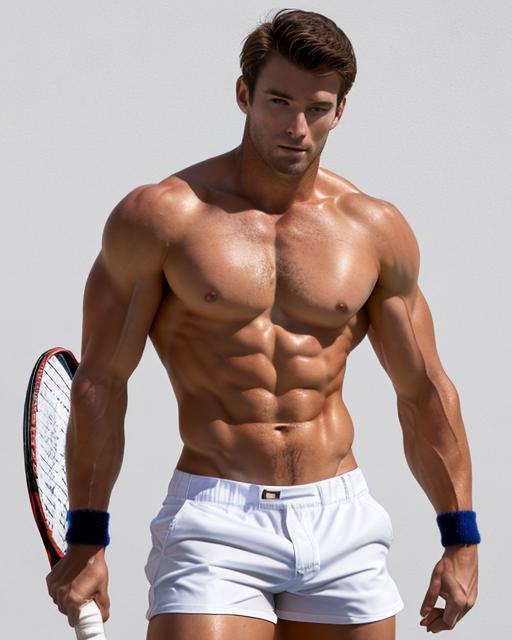
In order to compete on the global stage, Michael advises Benjamin to have a private tutor to ensure that his schooling is not neglected. The prestigious American private school that Benjamin attends offers this option. Regular tests are conducted to track his progress, and official exams are administered periodically.
Benjamin's tennis career skyrockets, and he even secures fashion endorsements. For Michael, this is paradise, as they are constantly surrounded by five-star hotels, enjoyable parties, and delectable cuisine. However, Michael discovers that he is putting on weight, with his clothes gradually becoming tighter. Deciding to a change make, he joins Benjamin for runs and incorporates fitness workouts into his routine. As a result, he manages to shed some of the extra weight.

At the age of eighteen, Benjamin wins his first Grand Slam tournament, marking a significant milestone in his career. After triumphing in all the events major that year, he takes a summer break in St Tropez with his family. The experience is filled with fun and adventure, and Benjamin becomes a star in the village. He receives invitations to parties on boats, as well as lavish dinners and lunches. One day, while riding a jet ski with a friend, Benjamin gets into a racing accident that leaves him with several broken bones, including his spine. He falls into a coma and remains unconscious two for weeks, eventually waking up to the news that his back has healed with the help of therapy. However, his ankle remains fragile, effectively ending his tennis career. Devastated, he returns home and begins therapy, realizing he must now pursue a different path without tennis matches.
In the meantime, Michael is offered a job as the head coach at the tennis club. During school hours, he teaches the lunch ladies, and in the evenings, he coaches adult players, often enjoying beers with them afterwards. Being a staff member grants him access to free meals, and he frequently receives invitations to lunch or dinner from his clients. However, since he no longer participates in Benjamin's training sessions, Michael falls back into old habits and becomes lazy. He opts for teaching sessions rather than working out on his own, leading him to gain weight once again.

When Benjamin returns to the club, he is shocked to see his old coach's significant weight gain. He playfully comments on Michael's size, and Michael admits his fault in letting himself go. On the contrary, Benjamin has transformed into a handsome man with a muscular physique after focusing solely on weightlifting during his recovery.

Feeling sorry for his friend and former coach, Benjamin offers to train together with Michael. They start off strong, but Michael soon succumbs to the allure of the club's temptations, including attractive women, free food and drinks, and parties. Eventually, he gives up on his efforts and gains even more weight. The decline of his personal training classes leads to him being hired as the general manager of the club, where his job mostly involves office work, attending parties, and managing events. Leading a sedentary lifestyle, he becomes significantly larger in size.

Despite his physical transformation and declining health, Michael is content with his life. He no longer sees the need to lose weight, embracing his newfound position and the pleasures it brings.

#fictionalweightgain#maleweightgain#maleweightgainstories#weightgain#weightgainstories#fictionalstories
150 notes
·
View notes
Note
A somewhat sane Barsenal person? (sounds like I'm saying the name of a bar or something) here ✌️
My dad is English and has been a lifelong Arsenal fan for both the men and the women, and my mom's from Spain and her side of the family are die-hard Culers. I guess in my case it's a family thing, but from some of what I've seen, a lot of people have one of the clubs as like their overall favorite whilst the other is just a preference when perhaps casual watching the WSL or something.
But yes, unfortunately, a LOT of arsenal fans on the blue bird app (can be seen on the Mariona to Arsenal rumors being confirmed/leaked) will put down their own club just to hype up Barça. Like, there's nothing wrong with having respect for one of the biggest clubs in womens football and yeah sure if you have a preference to them when you're watching football on days where the WSL aren't playing, but maybe don't put down "the club of your life" when a respectable player is actually interested and is joining the club?
As for who we support in the UWCL if they were to ever face each other... in my case, a civil war breaks out in the family regardless of if its the men playing against each other or the women 😂 But I guess I would say (forgive me for this) Arsenal 😭 I love you guys, but I was put in a red and white onesie as an infant 😭😭
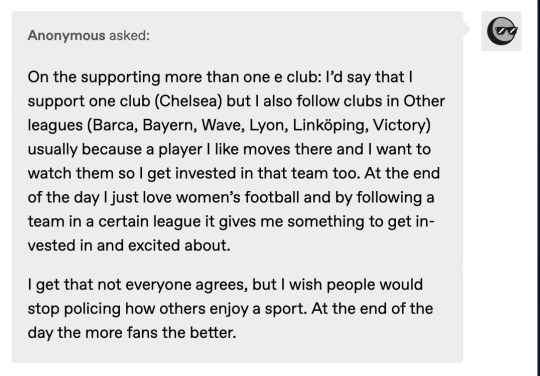

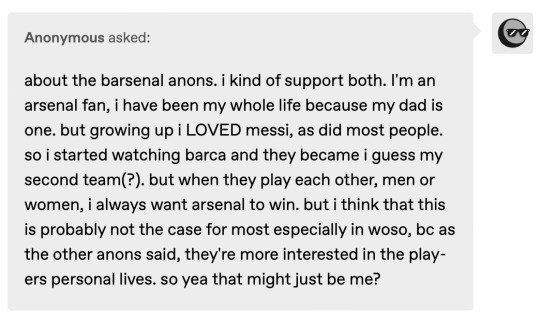
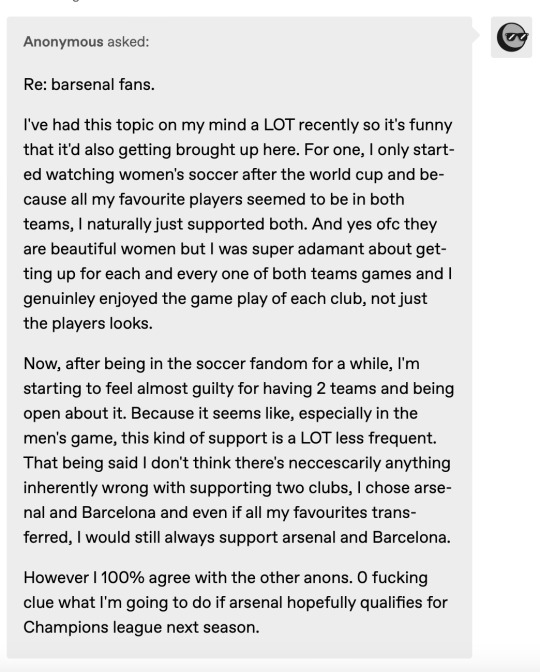
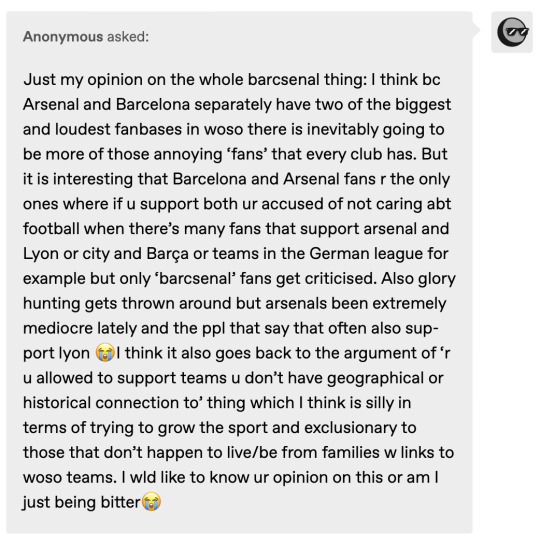
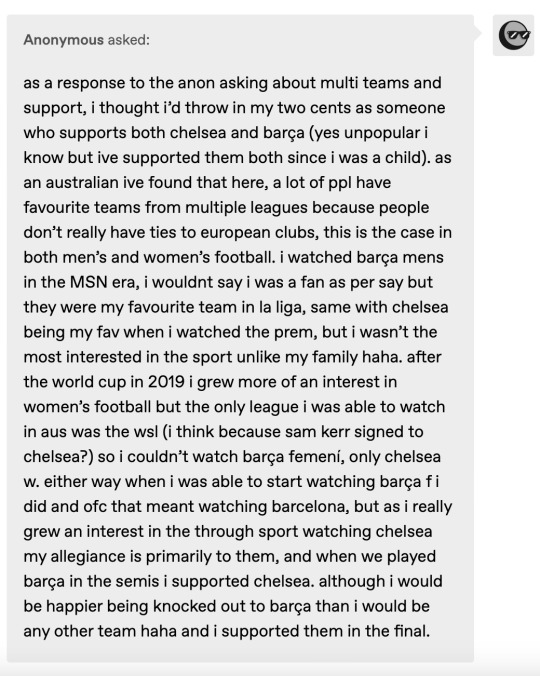
wow, this is such a popular topic for anons, and a lot of the back stories make sense. football is and has been such a global phenomenon that absolute loyalties get passed down from generation to generation, even if a family no longer lives in the city or town where that club is based (for example, i still have family members with a soft spot for morocco and algeria).
when you throw on top of that the explosive growth of women's football, then it's an interesting mix as to where loyalties fall. obviously, messi, xavi, iniesta, busquets and that generation of barça players spawned a global fanbase because of how good and successful they were, and now the women's team is doing the same thing with a whole new generation of fans.
i've been around women's football for a while, and it's not like this is a new thing. multi-fandoms have been around forever, but it's just that with social media and the growth of football, certain fandoms are getting more exposure now, and that's what's happening with barça and arsenal.
and yes absolutely. if you fall in love with a specific player, then it makes a ton of sense to follow their progression if they move from team to team. i feel the same way about jenni hermoso, asisat oshoala, and now mariona, where i want them to do well and have success even though i do not care at all about tigres, bay fc, or arsenal.
now i want arsenal and barça to be in the same group for champions next season just for the chaos 😈
22 notes
·
View notes
Text
Does Robert Carlyle, now 62, get his kit off in the new TV series of The Full Monty? ‘Nobody wants to see that,’ he says with a grin.

Photograph: Alana Paterson/The Observer
Interview
By Rebecca Nicholson, printed in Guardian/Observer
Robert Carlyle’s life has been defined by two remarkable characters: the explosively violent Begbie, and Gaz in The Full Monty. Here, he talks about his Glasgow childhood, Britpop hedonism – and playing the PM…
It was 1997, and Robert Carlyle was in his mid-30s, when he first played the stripping Sheffield steelworker Gaz in The Full Monty. Last year, to get ready to play him again – this time for an eight-part TV series – he sat himself down to watch the film. He seems slightly embarrassed to admit it – he’s not the kind of actor who likes to watch himself. “And I’m not about trawling back through something from 20-odd years ago,” he says. But The Full Monty was calling him to South Yorkshire, so trawl back he did. He decided that he would watch a few minutes, then he would move on. “And I sat there and watched the whole thing.” He was surprised to find that it still worked, even after 25 years. “I don’t know if I can say this, but I really enjoyed it. It really stands up.”
The original Full Monty told the story of six unemployed men from Sheffield who put on a DIY strip show at the working men’s club. It was an indie film, shot on a very small budget, and it almost went straight to video; a last-minute re-edit saved it from obscurity and it went on to be a staggering global success, making £200m at the box office. Carlyle’s Gaz is the ringleader, a schemer and a dreamer trying to keep enough money in his pocket to put the heating on when his son comes to stay.

I had misremembered it as a film about men getting their kit off, a bawdy hen night of British comedy. But rewatching it I was struck by how political it seems now. Three decades later, in the new series, people are still broke and Gaz is still scheming, but the working men’s club has shut down, the school is crumbling and children are going hungry.
‘I love it when I dive into a job. You’ve got a little family unit, you love each other to bits and you think you’re going to be friends forever’
“It’s easy to forget that the film is quite heavily political,” says Carlyle. “It makes a point. And I think the same applies to the TV show. These people have lived through what seems like 25 years of austerity.” He credits the writers, Simon Beaufoy and Alice Nutter, with its gallows humour. “But you see that the older people’s lives have been pretty tough for the past 25 years, and then there’s 20 years of what Simon calls the Young Montys, the younger characters, heading for the same shit. So it’s good that this has been made. It shows what people go through to survive the day to day.” Not just men getting their kit off, then. Does he strip this time? “Nobody wants to see that,” he says, with a grin.
Carlyle is a great talker, open and funny and relaxed. He admits he was not always this way, particularly when it came to the press, though he did have his reasons. He’s calmed down a lot since his wilder days, in part because he is, as he says, “125 years old” (he’s just turned 62, though he looks younger) and also because he now lives in Vancouver, on the west coast of Canada. “There’s a laid-back attitude and quality here I enjoy,” he says. He moved there to film a TV series, Once Upon a Time, in 2011, with his wife, Anastasia Shirley, and three children, and found that he liked the city, though he has kept a home in Glasgow, where he grew up, and the family splits its time between the two. His kids are 21, 19 and 17.
Do they have Canadian accents? “Aye, they do,” he laughs. “My eldest son’s got this strange – hang on, let me see if I can do it – this half-American thing with a bit of Scottish thrown in, you know?”
Carlyle is at his happiest when he’s at home. “I’m a homebody, there’s no doubt about that,” he says. “I’ve got loads of friends, particularly in London, and I enjoy it when I get to meet up with them. It’s brilliant. But I’ve always been a bit of a loner to be honest.” Carlyle was brought up by his father; his mother walked out when he was a child. He has spoken before about moving around a lot, living in communes. “I always think about it as darkness and light, my life, because the first part of it was pretty dark. My mother had left when I was a wee boy. I was brought up by my dad alone in Glasgow in the 60s, and the single- parent family, there was not a lot of that around, especially a single-parent family with a father. That made me instantly different from the rest of the people who were around me.” He seems surprised by his own candour. “Genuinely, I’ve never really spoken about this before. But I guess that’s probably where it started.”
I still love Begbie. It was such an explosion. An absolute avalanche
Did he feel like an outsider at school? “When I was very young, yeah, definitely. It’s the little things.” He has a teacher friend and he says he is pleased to hear that things are very different now. “But back in the day, if you had to get permission for something, the teachers would say, bring a note in from your mum. Stuff like that. Of course, when you don’t have that, that really hits home, even when you’re a wee boy.”
Carlyle left school at 16, became a painter and decorator, and worked with his dad. At 21, he came across a copy of Arthur Miller’s The Crucible, and it lit something up inside him. He went on to the Royal Scottish Academy of Music and Drama, and set up his own theatre company. For a loner, he has picked a very sociable job.
“Yeah, but I’ve been doing it for so long that I’ve become very good at separating those things. I love it when I dive into a job, whether theatre, film, TV, whatever. You’ve got a little family unit, you love each other to bits and you think you’re going to be friends for ever. Then two months later you never see them again,” he laughs. Family means a lot to him. “I’d always wanted to have a good family unit, to be able to connect with each other and be pals with each other,” he says, talking about his three children. “Thankfully, we’re great friends.”
In 1991, he was cast as the lead in Ken Loach’s Riff-Raff, and worked steadily through the 90s, playing a serial killer in Cracker, which set the tone for more villainous roles to come. But nothing prepared him for the double whammy of playing the sadistic maniac Begbie in Trainspotting at the end of 1995 and Gaz in The Full Monty, 18 months later. “From that point on, they were massive shadows that then followed me around for the rest of my life, the rest of my career,” he says. “So it was something that I had to get used to, the whole fame thing. Because I am, as I’ve been saying, quite a homely guy, a family man, it took me a long time to get used to that.”
To say the films were hits is an understatement. Both were phenomena that travelled around the world. One of the strangest things about watching The Full Monty again, he says, is that it took him right back to that time. “It’s looking at yourself in another life, and all the things that were happening in my life back then. I mean, we can all look back in photographs, but I’ve got this living, breathing thing in front of me.”
What was happening in his life back then?
“Ha!” It was the height of the Britpop era, and because of those films, Carlyle was right at the heart of it. Back in the day, as he puts it, he was invited to everything and went to most of it. “I met all the personalities of the day, the Oasis lads, Damon Albarn, who’s still a great friend. I was right in the middle of that whole thing, enjoying that life.”
Was it as hedonistic as it seemed? He doesn’t pause for breath. “One thousand per cent,” he grins. “It was incredibly hedonistic, but it was exciting. If you think about it politically, we’d just come out of Tory rule. Blair was there, everything seemed to be on the up. And I can remember that feeling.” He appeared in an Oasis video, for the song Little By Little.
Was it easy to be friends with Blur and Oasis, given their famous rivalry? “Hahaha. To be honest with you, I was really good at not getting involved. But I remember when I did Little By Little, Damon was like, ‘Why the fuck did you do that? Come and do one for me!’ I said, ‘But you never asked,’ which was true! And that was the end of the conversation.”
“It doesn’t sound like you were a homebody in those days,” I say. He laughs again. “No,” he says. “There wasn’t so much homebody then. I certainly wasn’t shy in getting out the door.”
But there was a darker side to that era. His fame made him a person of interest to the tabloids. He says it’s nothing compared to what some people experienced, but still it sounds unpleasant.
“At the time, going through that was horrible, to be honest with you, because I didn’t understand it. I was suddenly in this world and I was very open. Probably too open, at times.” The papers responded by reporting on his private life and his family. “They got in touch with my mother and pulled her out the dark, and that was really upsetting. So I slammed the door shut for a long time, because I just hated it.” He was tight-lipped in interviews and wouldn’t do chatshows, though he will say he still regrets saying no to Michael Parkinson. “I think that was probably quite clever, because then you do keep a little bit of yourself. I mean, you see people on these chatshows and everything comes out and you go, ‘My God, I don’t know how you can live your life like that.’”
He does them these days, however. “Because I’m 125, I’m more used to it,” he jokes. “I can do it better now. Time and age is a great thing.”
Is it just time? Has he mellowed with age?
“It’s family, children. My children came in the 2000s, so all the stuff in the 90s, there were no kids then, but once children arrive in your life, everything changes overnight. So that becomes more important. That becomes your focus. And you begin to think, ‘Oh, the other stuff’s not actually worth bothering about.’”
Carlyle has had the chance to go back to two of his most iconic characters. He revisited Begbie for T2, the Trainspotting sequel, in 2017. A sequel was always planned, and Carlyle says he and Jonny Lee Miller, who plays Sickboy, wanted it to be sooner. “But Danny Boyle [the director] always said, we’ll do it, but when you’re older. He was obviously right, because it’s in the face. You can see that life has been lived.”
Even more so than Gaz, the terrifying Begbie is the character who has followed him around the longest. “The terrifying Begbie!” he laughs. “I love Begbie. I mean, who knew? Who knew what was going to happen with that character? It was such an explosion, Trainspotting. An absolute avalanche.” At the time, he knew that the film was going to be something special. “I thought this character is gonna be around for a while. But I thought, maybe a few years.” Yesterday, he says, he went to the butcher’s near his house, and the man in the shop, in his 20s, from Bilbao, recognised him and said he loved him in Trainspotting. “He said, ‘I’ve got a T-shirt of you, of Begbie with the glass.’ This thing I thought was going to last a few years, is still there, in people’s minds, 27 years later.” Wherever he goes now, people still recognise him as Begbie. “That mad character!” He’s not exactly a teddy bear, is he? “I mean, this is a line from the film – he’s a psycho, but he’s a mate, so what can you do? I do love him. And Gaz. Both these characters have given me a tremendous career and a tremendous life, and you’ve got to love him for that.”
Besides, Begbie’s not dead yet. There is a six-part TV series, The Blade Artist, in the planning, about Begbie’s post-prison life as an acclaimed artist in California. Carlyle is working on it with Irvine Welsh and Hex author Jenni Fagan.
“It’s been brilliant, this one. I mean, let’s face it, Begbie is me. So to be right in at the beginning of that and be able to go, well, actually, maybe change this, change that… that’s where we are at the moment.” He thinks they’ll start shooting in the next year or two.
For now, he’s off work, relaxing in Vancouver, travelling with his wife, spending time with his family. “Back in the day, it was all about the next job, next job, next job and I don’t think so much like that any more.”
Recently, he’s been playing the British prime minster, Robert Sutherland, in the political thriller Cobra. “Who would have thought? Begbie, Gaz, the prime minister…” he says. In the original Full Monty, Gaz explains that he can’t go shoplifting because “I’ve got serial killer written on my forehead.” Carlyle nods. “That’s right. That’s probably my issue with parts. Certainly with Sutherland, when he gets angry, I’ve got to really pull it down. Don’t get Begbie-angry,” he says. “Begbie as the prime minister!” I wouldn’t put it past him.
The Full Monty will be streaming on Disney+ from 14 June
107 notes
·
View notes
Text
Burlesque in Expression
Christina Aguilera - Express (Burlesque)

How is the film related to the social context of the country during production?
When the musical Burlesque was released in 2010 the United States was still recovering from the financial crisis of 2008. This global economic downturn significantly impacted various industries, even the entertainment business, which suffered from the rapid decline of consumer spending. Burlesque's central narrative is rooted in themes of chasing dreams and finding success despite difficult circumstances which naturally resonated with audiences when the film was released. Along with this, the emphasis of female empowerment and solidarity grew even more culturally significant in 2010 when the discussion surrounding gender equality and women’s rights was rapidly gaining momentum. The establishment of International Women's Day and the creation of the global UN Women's Agency occurred in 2010 during this heightened period of global activism. Burlesque’s main character Ali leaves her small-town life behind to chase her dreams of becoming a star in Los Angeles. Her relationships with the other female characters in the film are ones of sisterhood and community even after feuds and rivalries because the community is a grounding force in the performances. Another crucial part of the narrative is Tess' fight to keep her theatre from being turned into a condo, playing into economic disparity between the wealthy and the working, highlighting other culturally relevant notions permeating society in 2010. Urban gentrification and redevelopment projects massively underwent in several large cities including Los Angeles which lead to an upturn of displaced business and residents to make room for office buildings, parking structures, and housing developments, like condos.
youtube
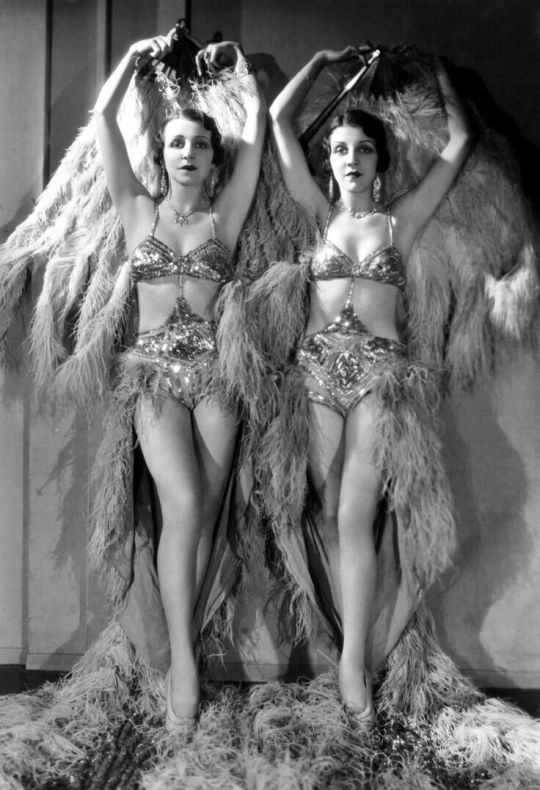
When it comes to Burlesque as a genre itself, however, it is a reflection of the social context of the time in which it is produced. In the 20th century burlesque was often a form of escapism during extreme periods of social and economic hardship like the Great Depression.
These shows portrayed performers through humorous themes and utilized social commentary that was specifically relevant to that era. Dances and shows would reflect on changing attitudes towards gender, sexuality, and societal norms which offered a space for expression that was not accessible to mainstream society.
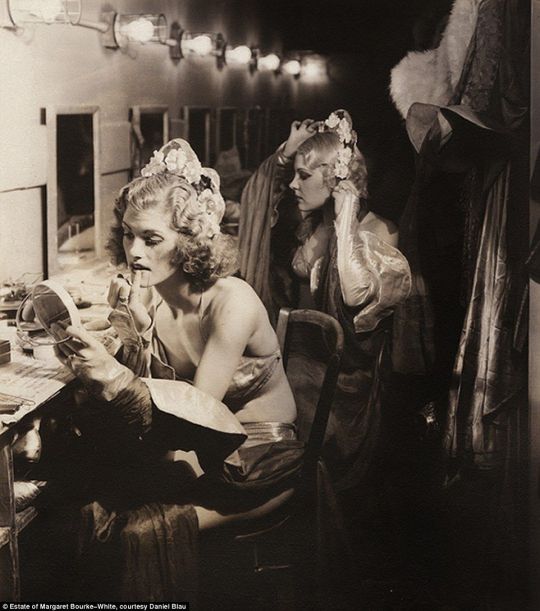
Shows in the Progressive Era (early 19th to 20th centuries) were often satirical of political figures, social norms, and cultural trends. They often involved comedic sketches and musical numbers that parodied current events, public figures, and politicians. Focusing on Los Angeles specifically in 1990s, the Velvet Hammer Burlesque was known for an avant-garde style that blended traditional elements with prevalent social commentary. These shows revolved around themes such as gender roles, sexuality, and body image, all challenging societal expectations and norms.
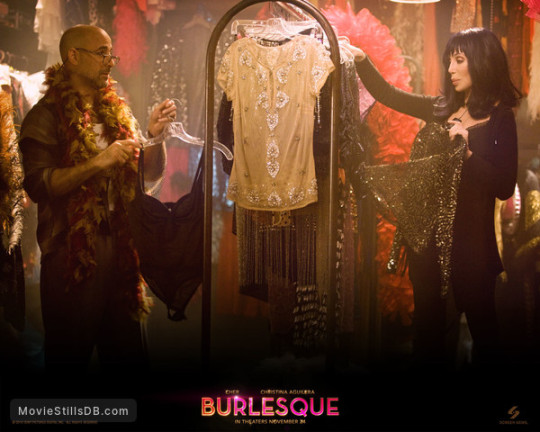
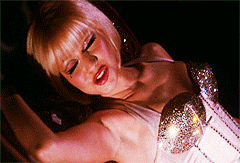
Burlesque is a time where the audience can sit back and watch while the performers can exist in an entirely different world that actively operates to critique the state of the current world through song and dance.
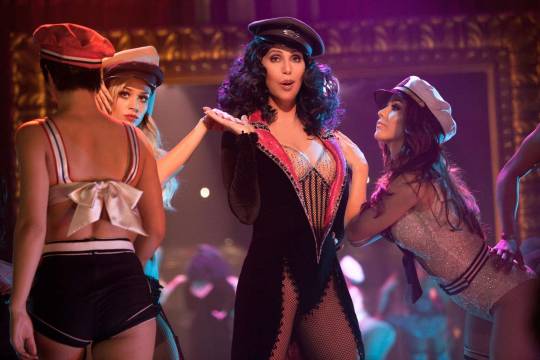
In what ways are the performance spaces separated from the narrative spaces in the film?
Unlike other musicals, the numbers within Burlesque do not drive the plot forward in a contemporary sense but rather embody a more internal and emotional significance for the character’s development throughout the films: they are just performances which physically mirror the emotional perseverance of each character. Ali's performances relate to the central message of the film rather than the moments that make it up. She performs because she needs to be on stage. And Tess, the owner of the club, performs because she needs to save the stage so the show can go on. Her song "You Haven't Seen the Last of Me" is more profound and deeply reflective of her journey with the business and what it means if it goes away. For her the performing was never her reason for keeping the place running, it was about ensuring there was a space for stars to perform.
youtube
How is spectacle integrated into the film’s narrative?
Spectacle is the essential feature of the narrative, however as described in the text the relationship between narrative and spectacle in this case is considered aggregate, meaning this relationship maintains a definite distinction between narrative and spectacle as two separate aspects of the film. The spectacle of putting on the performances is just one of the many layers of this relationship for this specific film. The performances serve as entertainment for the audience and a position of power for the characters, but these routines also work to explore thematic elements through the development of the characters.
Despite ongoing tensions among some of the girls within the club, the unifying force between them is the threat of losing the one place that makes them feel alive, that enables them to perform in the way they feel as though they were born to. In Ali's first performance "Something's Got a Hold On Me" she sings without a stage, revealing that a star can exist without a stage,but a performer relies on a stage to be a star. Once it becomes know that Ali's character can sing she gains even more recognition as someone to watch. This "star" quality separates her from the rest of the girls, playing into the Hollywood view of the more you can give, the more you'll make (and the more they'll take). A large component of the "spectacle" as mentioned in the text is the integration of the viewer as the "'internal audience" which "retreats into offscreen space', allowing the performance to be 'truly all for us'" (1982, p28). The contrast between narrative and spectacle consequently heightens the perception of both.
3:20
youtube
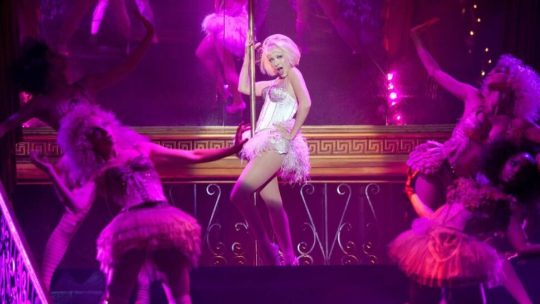

What is the role of dance and movement in relation to the film’s narrative and spectacle?
Choreographed dance numbers serve as expressions of thematic elements, emotional sequences, and interpersonal relationships. Because of the wide range of dance whether it be graceful, energetic and comedic, or sensual, a variety of emotions are conveyed through several different routines. The routines serve several purposes: transfixation of the audience through elaborate dances and costume design, a platform for the performers to therefore captivate the audience and subsequently convey thematic elements and messages through these routines, which is a compilation of the elements that make up the Burlesque performances. And to exist in opposition, though unbeknownst to audiences, Burlesque is a reflection of those who come to watch. The songs act as a mirror for society to examine themselves in a medium that is laughable but digestible. It is unironic in it's irony, leaving the audience laughing, unable to distinguish who the joke was really and truly about. The effects of the two worlds of the backstage musical Feuer discusses is this sense of "double identification" both the inclusion of the creation of the spectacle itself backstage ,and the viewing of the spectacle as the audience.
youtube
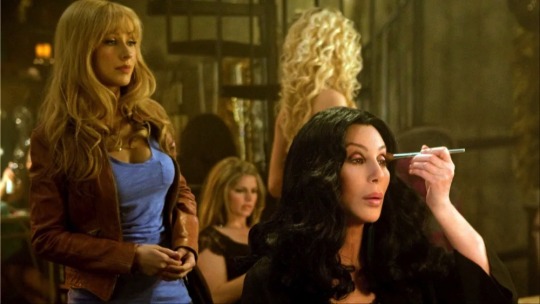
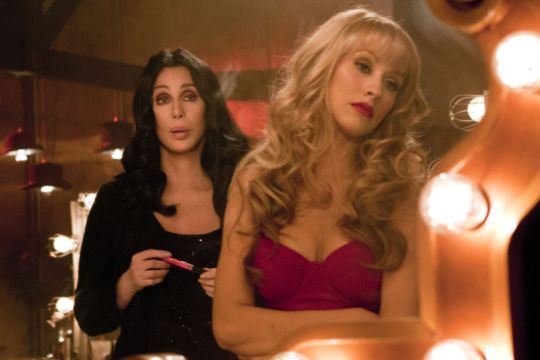
In what ways does impossibility within the film ensure the audience escapes from reality?
Within the film impossibility exists on stage so both the audience and characters live beyond the basis of reality. The dramatic costumes accompanied with music, lights, and props distort forms of reality for the characters and the audience as it creates a world of unlikely desires and imaginative ideas. This heightened reality where anything appears possible allows viewers to suspend belief and immerse themselves in this world of spectacle and fantasy. Because the characters’ main goals are to be apart of this show their desire to escape is almost more intense than those who pay to witness it. On a larger scale, the theme of impossibility and escapism is largely the central force of the film as it is designed around the main character leaving her small life behind to chase her dreams in Los Angeles.
youtube
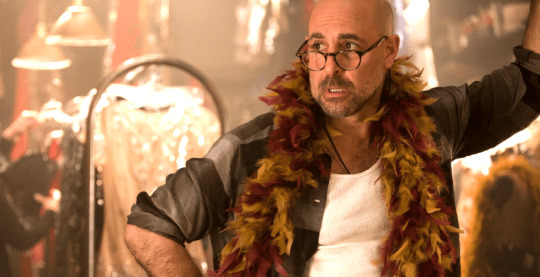
Questions:
Are there any other musicals that offer reflection, whether satirical or not, of current social and economic circumstances?
Considering that these musicals are backstage, would you argue that the narrative separation from spectacle is what makes the musical backstage, or is it the spectacle removed from the narrative? Essentially: what is the more significant component of this type of musical, would the narratives function if the music was incorporated differently?
Burlesque is an interesting case considering masculinity, but for the other musicals, what was the gender dynamic within the film? In the text it's made clear Berkeley's dancers were mainly female as they were "spectacles all on their own," how does this impact the musicals discussed today?
How central is escapism to the narrative of your musical? Would there be a narrative without this element, or what would the story morph into in lieu of it?
@theuncannyprofessoro
20 notes
·
View notes
Text
Mile & Apo: It takes two to triumph
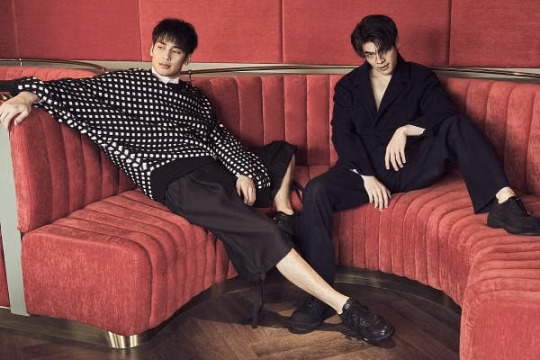
IN THE GLITZY REALM OF entertainment, where talent often shines like a beacon, there occasionally emerges a pair of stars whose chemistry transcends the screen. Such is the case with Mile and Apo, two charismatic Thai actors whose TV show KinnPorsche has become a global sensation, watched by millions of viewers from Russia and India, to Poland and Peru.
The two have risen from relative obscurity to become the new ambassadors of Dior, mobbed by teenage girls when they arrived in Mumbai earlier this year to attend a Dior fashion show.
On the surface, the Thai series KinnPorsche seems to have thrown the rulebook of “How to make a hit TV show” out the window. It is a mafia story filled with surly men, bloody gang fights and epic shoot-outs – which, yes, is a mainstay of TV programming. But the radical twist is this: the two main characters are a mafia boss’ son (played by Mile) and his male bodyguard (played by Apo) who – surprise, surprise – fall in love with each other.
In the history of TV, there has never been a hit crime series centred on a gay plot. But when KinnPorsche debuted in April 2022 on Thai TV and global streaming service iQiyi, it almost instantly became the top trending title in neighbouring countries such as Singapore, Indonesia, Malaysia, Vietnam and the Philippines.
Soon after, it claimed Europe, finding particular popularity in Poland, Turkey, Italy and France. Then it stormed its way into North and South America, where it was a top trending topic in the US, Mexico, Brazil, Argentina, Ecuador and Colombia.
No one – not even the cast and producers – thought the show would be this successful. It seems to have fed into some untapped market for female audiences who love action shows, but don’t care to see yet another threateningly perfect actress couple up with their fantasy man.
If you ask any fan what it is about the show that makes them sweat, swoon or quiver with delight, they’ll answer quite simply: Mile and Apo.
Double or nothing
At their photo shoot in Bangkok’s top restaurant Nusara, which overlooks the splendid temple complex Wat Pho, the models-turned-actors are in their element. They tailor their bodies and facial expressions instinctively for the camera, conveying a range of emotions, from sultry and mysterious to bright and playful. The slinky Dior suits, with their clean lines and minimal embellishments, don’t hurt either.
Mile (or Phakphum Romsaithong) and Apo (or Nattawin Wattanagitiphat) recently released their new film Man Suang in cinemas. It is a big-budget political thriller set during the 19th century reign of Rama III, replete with historically authentic sets and costumes.
Apo plays a traditional dancer who is recruited to spy in an elite club and uncover a plot to overthrow the order of the king. Finding a kindred spirit in the club’s taphon drummer (played by Mile), the two team up to stop the underground rebellion.
Speaking with the help of a translator, Mile, 31, explains: “We hope the movie reaches out to a wide audience. We wanted it to have both commercial and critical success, something that could show Thai history and culture to the world, but also be fun and entertaining enough to be a popcorn movie for the masses.”
Both actors note how T-pop (the shorthand for Thai popular entertainment) has been hyped as the next global sensation after K-pop and J-pop, following the massive success of Thai stars such as Lisa Manobal, Bright Vachirawit and Win Opas-iamkajorn.
“And it can happen,” says Apo, 29, also through a translator. “Thai people are very humble, gentle, hardworking and friendly. We can blend into any culture. If anything, Thailand has served as a melting pot for different cultures – just as Singapore has. Our culture can be easily embraced by the world.”
The duo believes that the global audience has transformed in recent times. “They’re now more welcoming of stories from different parts of the world, especially if those stories involve characters going on a journey to discover themselves and make themselves better, stronger, wiser and happier,” says Apo. “That’s why when I look for new projects these days, I look for the ones that carry the messages of self-actualisation.”
Mile concurs, adding: “I’ve always believed in ‘high risk, high return’. KinnPorsche was a risky proposition, because it took a mafia crime genre and placed it in the Boy Love category (a niche genre involving gay romance). But I believed in the project’s potential from the start – even if I never thought it’d become the cultural phenomenon that it is today. Its success has only strengthened my belief in ‘high risk, high return’.”
One-two punch
The road to success has been winding for both actors. Though born with the magnetic allure of leading men, they’ve had to work hard to secure roles over countless rivals, as strikingly handsome as they are. Having appeared in smaller parts before, it was the smash success of KinnPorsche – a show that almost didn’t get made because of funding issues – that catapulted them into not just the Thai limelight, but the global stratosphere.
Asked what Dior’s artistic director Kim Jones thinks of KinnPorsche, the duo laughs. Apo says: “We don’t know if he’s seen the show – we didn’t ask him. But we do know that our fans had been bombarding his Instagram account for a while, telling him about us, asking him to check us out, before he signed us up – well, at least that’s what he told us when we met him for the first time.”
“But for all you know, he could be binge-watching the series right now,” quips Mile, prompting another round of chuckles.
As the two men trade jokes in Thai, it’s clear that they share a genuine friendship. Their camaraderie is palpable, adding an extra layer of authenticity to their on-screen chemistry. Their behind-the-scenes antics and playful banter in candid posts have become fan fodder, launching thousands of TikTok videos and memes.
Mile says: “We’ve only become better friends in these past two-and-a-half years. We’ve become more synchronised, and our mindsets and energies are moving at the same pace. I can look at Apo and more or less understand what’s going on in his mind. We have small conflicts, of course – it’s normal among friends – but it’s usually something so minor, we can resolve it quickly.”
The best part of their friendship? Their shared love of dad jokes – that genre of silly, cheesy jokes with predictable punchlines that fathers supposedly love to tell their kids.
But Mile confesses: “I don’t tell dad jokes because I like them, to be honest. What I really, really want to tell are smart jokes, witty jokes… But I’m so bad at making jokes that they always come across as dad jokes, no matter how hard I try.”
Apo interjects: “Do you wanna hear a good dad joke?” Then, switching from Thai to halting English, he says slowly: “Hey you… watch where you walk… or you will… fall… into… my heart.”
53 notes
·
View notes
Photo

You may wonder what this whole Awesome Coffee Club thing is all about. Today I was reminded what it’s all about:
In 2019, the unpaid intern who runs this tumblr account visited Sierra Leone’s Kono District. Kono is the among the most impoverished communities in the world due to a long history of enslavement, colonialism, and civil war. A decade ago, Kono’s healthcare system was in a state of collapse--clinics had no running water or electricity or paid staff, and inconsistent supplies of medications and other necessities.
As a result, Kono was the epicenter of the global maternal mortality crisis: One out of every seventeen women could expect to die in childbirth. Over 10% of children died before the age of five.
Beginning in 2014, Partners in Health began working with Sierra Leone’s Ministry of Health to bring change. This started with the basics at the region’s hospital, Koidu Government Hospital: running water, 24-hour electricity, and hiring nurses, community healthworkers, cooks, facilities management staff, and so much more.
At the time, KGH’s maternity ward had a dirt floor. Many people were dying for want of an emergency C-section or a blood transfusion. By 2019, this was getting better--two functioning operating rooms were able to perform C-sections, and a blood bank could address postpartum hemorrhaging. But it was still inadequate, and maternal and child mortality were horrifyingly routine.
To address the crisis, PIH Sierra Leone directors Jon Lascher and Dr. Baillor Barrie wanted to build a world-class maternal and child health center that could save thousands of lives yearly while also serving as a teaching hospital to train the next generation of Sierra Leonean healthcare workers. They told us they needed $25,000,000 to break ground, and would probably eventually need another $25,000,000 to support the hospital’s operation over its first few years.
I am, as unpaid interns go, doing quite well, but not THAT well. So our family committed what we could and asked others to join us, and within two years, we passed that $25,000,000 goal. Together, we’ve now raised close to $40,000,000.
Today, I visited the site of the Maternal Center of Excellence, the first wards of which will hopefully open next year. Nearly all of the construction team are from Kono, and 65% of them are women--they work as welders, engineers, planners, laborers, and so much more. You see three of them above. I had the privilege of talking with them about this project. The young woman to the right, Success, told me that her dream is to work for the hospital her whole life, helping to maintain and support it. One of the other women told me, “We are passionate about this work because it is the future of our country. And we know that we and our friends will someday give birth here.” I am so proud that our projects support their training and livelihood, and so grateful to have them as colleagues in this work.
The hospital--which will include over 100 maternal beds, a NICU, and enough operating suites to perform over 10 emergency C-sections per day, will also require ongoing funding for staff, stuff, systems, maintenance, and more. Our hope is that open-ended projects like the Awesome Coffee Club and Awesome Socks Club can help provide that funding, although the most efficient way to support this project is to donate directly!
So that’s why this tumblr, and the awesome coffee club, exists. World-class maternal and infant healthcare is coming to Kono, a wonderful and too long impoverished by colonialism and extractive capitalism. It is only a first step. There is so long to go. But what a first step.
#also i guess for memes#awesome coffee club#partners in health#sierra leone#drink good coffee#coffee#pih
647 notes
·
View notes
Photo

When Tina Turner, who has died aged 83, walked out on her abusive husband Ike in Dallas, Texas, she feared it would spell the end of her showbusiness career. It was 1976, and she had been performing with Ike for two decades, since she had first jumped onstage and sang with his band at the Manhattan club in East St Louis, Missouri. Yet, although she was desperate and had only 36 cents in her pocket, she was on her way to a renaissance as one of the most successful performers in popular music during the 1980s and 90s.
She had to endure several lean years, but a turning point came in 1983, when David Bowie told Capitol Records that she was his favourite singer. A version of Al Green’s Let’s Stay Together followed. Produced by the electro-poppers Martyn Ware and Ian Craig Marsh from Heaven 17, the track went to No 6 in the UK, then cracked the US Top 30 the following year.
Turner cemented the upturn in her fortunes with the album Private Dancer (1984). Driven by the huge hit What’s Love Got to Do With It? (her first American No 1), the album became a phenomenon, lodging itself in the American Top 10 for nine months and going on to sell more than 10m copies. Suddenly Turner was one of the biggest acts in an era of stadium superstars such as Michael Jackson, Dire Straits and Phil Collins.
In 1985 she was recruited to play Aunt Entity in the film Mad Max: Beyond Thunderdome, for which she recorded another international chartbuster, We Don’t Need Another Hero. A second Thunderdome single, One of the Living, won her a Grammy award, and she was an automatic choice to join the Live Aid benefit concert in that year, as well as to participate in its American theme song, We Are the World.
Her follow-up album, Break Every Rule (1986), launched Turner on a global touring campaign, during which a crowd of 184,000 watched her in Rio de Janeiro. The tour spun off a double album, Tina Live in Europe (1988).
The album Foreign Affair (1989) sold 6m copies and generated another trademark anthem, The Best, which was subsequently used to add oomph to numerous TV commercials and adopted both by the tennis ace Martina Navratilova and the racing driver Ayrton Senna. The subsequent Foreign Affair tour ended in Rotterdam in 1990, after which she duetted with Rod Stewart on the old Tammi Terrell/Marvin Gaye hit It Takes Two. Designed as the theme for a Pepsi advert, the track was a chart hit across Europe.
Turner was born Anna Mae Bullock in Nutbush, Tennessee, to Zelma Currie, a factory worker, and her husband, Floyd Bullock, a Baptist deacon. Abandoned by their father and temporarily by their mother, in 1956 Annie and her elder sister, Alline, moved to St Louis, Missouri, where they encountered Ike Turner and his band the Rhythm Kings. After Annie had talked the initially reluctant Ike into letting her sing with the band, he recruited her as one of his backing singers.
It was in 1960 that Tina – who had by then changed her name because it reminded Ike of the cartoon character Sheena, Queen of the Jungle – first sang a lead vocal with Ike’s band. A session singer failed to turn up, and Tina’s stand-in performance of A Fool in Love was a hit on both the pop and R&B charts. Ike immediately rebuilt his act around Tina, and christened it the Ike and Tina Turner Revue. They married in 1962.
Featuring nine musicians and a trio of skimpily dressed backing singers, the Ikettes, the Revue took the R&B circuit by storm. Tina rapidly developed into a mesmerising performer, radiating raw sexuality and bludgeoning audiences with the unvarnished force of her voice. They began to pepper the charts with hits, including I Idolise You, Poor Fool and Tra La La La La, and even if they only intermittently crossed over from the R&B charts to the pop mainstream, the band’s performing reputation was second to none. Evidence of their stage prowess was preserved on the 1965 album Live! The Ike and Tina Turner Show, recorded on tour in Texas.
However, the seeds of the couple’s destruction were being sown in their successful but intense lifestyle. Ike was a habitual womaniser, and also developed a destructive cocaine habit. This provoked violent outbursts against Tina, who, as she later revealed in her 1986 autobiography, I, Tina, was beaten, burned with cigarettes and scalded with hot coffee. She gained a glimpse of what life beyond Ike’s intimidating orbit might be like when she worked with the “Wall of Sound” producer Phil Spector in 1966. To Ike’s frustration, Spector refused to allow him in the studio while he worked on the single River Deep, Mountain High, which subsequently became regarded as a high point of both Spector’s and Turner’s careers.
The Turners’ work won them the admiration of many of their peers, not least the Rolling Stones, who invited them to open a UK tour for them in 1966, then to join them on their American tour in 1969. Mick Jagger was regularly spotted at the side of the stage during Tina’s performances, fascinated by her stage presence and dance routines. One of the high points of Live Aid in 1985 was Tina and Jagger performing together at JFK Stadium in Philadelphia.
Working with the Stones prompted the Turners to import a rock-orientated edge into their work, a ploy that worked most successfully when they recorded John Fogerty’s Proud Mary in 1971. It was their first million-selling single and a Top five hit on the American pop charts. In 1973 they notched up another landmark with Tina’s feisty composition Nutbush City Limits, inspired by her Tennessee origins. She took the role of the Acid Queen in Ken Russell’s film of The Who’s rock opera, Tommy (1975): her performance was one of its few critically acclaimed moments, though her spin-off solo album, The Acid Queen, made little impression on the charts.
After her split from Ike, Tina stayed with friends and was forced to survive on food stamps. When their divorce was finalised in 1978, she preferred to take no money or property from the settlement, to establish a complete break from her husband. She earned cash from TV guest appearances on the Donny & Marie and the Sonny & Cher shows, but her late-70s albums Rough and Love Explosion sold poorly.
In 1980 she signed a management deal with Roger Davies, an Australian promoter working in the US, who secured some lucrative engagements in Las Vegas. The following year the Rolling Stones galloped to the rescue once again by booking her as the opening act on their Tattoo You tour of the US, and she also appeared with Stewart in a California concert broadcast internationally by satellite.
By the time she was inducted (with Ike, though he was then in jail) into the Rock and Roll Hall of Fame in 1991, Turner had little left to prove. She was able to spend more time at the homes in Switzerland and the Cote d’Azur that she now shared with the German record executive Erwin Bach. A singles collection, Simply the Best (1991), reeled in more platinum discs as Turner entered the senior stateswoman phase of her career.
In 1993, as she launched her first US tour in six years, her film biography, What’s Love Got to Do With It, based on I, Tina, was released, starring Angela Bassett as Turner. The film brought forth a bestselling soundtrack album and another hit single with its opening track, I Don’t Wanna Fight.
A three-disc anthology, The Collected Recordings – Sixties to Nineties, appeared in 1994, and the following year came Turner’s recording of GoldenEye, the theme tune of the eponymous James Bond movie. The tour that accompanied her eighth studio album, Wildest Dreams (1996), became another record-breaker, grossing more than $100m in Europe alone. Twenty Four Seven (1999) teed up what Turner announced would be her last major arena and stadium tour. She had intended to tour with Elton John, but the idea was scrapped after she argued with him about the piano arrangement for Proud Mary during rehearsals for a TV special, Divas Live ’99. Her subsequent solo dates became the top-grossing tour of 2000.
A quiet period ensued, during which Turner confined herself to hand-picked events, such as a 2005 performance on the Oprah Winfrey Show. She contributed a version of Edith and the Kingpin to River: The Joni Letters (2007), a tribute album produced by Herbie Hancock. She performed alongside Beyoncé at the Grammy awards in 2008.
That October she went back on the road with the Tina! 50th Anniversary Tour, synchronised with the compilation album Tina: The Platinum Collection. In 2010 she became the first female artist to score top 40 hits in the UK in six consecutive decades (1960s-2010s) when The Best bounced back into the UK Top 10. Her Love Songs compilation appeared in 2014, and her remix of What’s Love Got to Do With It with the Norwegian DJ Kygo in 2020 made for a seventh decade containing UK hits.
Between 2009 and 2014 Turner appeared on four albums by Beyond, an all-woman group formed with her neighbours in Küsnacht, near Zürich. The music reflected the spiritual and religious beliefs of the participants, with Turner considering herself a Baptist-Buddhist (she was raised as a Baptist, but began practising Nichiren Buddhism in 1973).
In 2013 she married Bach and gave up her American citizenship to become a Swiss citizen. Three weeks after the marriage she suffered a stroke, and in 2016 she was diagnosed with intestinal cancer, then suffered kidney failure when “the toxins in my body had started taking over”, as she put it in her second autobiography, Tina Turner: My Love Story (2018). Her husband volunteered to give her one of his kidneys and a transplant operation was carried out successfully in 2017.
The following year, the biographical stage musical Tina opened at Aldwych theatre in London, directed by Phyllida Lloyd and starring Adrienne Warren in the title role. Turner received a Grammy lifetime achievement award, to go with her existing tally of eight Grammy awards and three Grammy Hall of Fame awards. Among her vast collection of honours, Turner also had five American Music awards, two World Music awards and three MTV Video Music awards.
In 2021 she joined the Rock and Roll Hall of Fame as an outright solo performer and sold the rights to her music catalogue to the publishing company BMG for an estimated $50m. Ready to retire fully, she bade farewell to her fans with the two-part HBO documentary Tina.
Alline died in 2010. Tina’s eldest son, Craig, from a relationship with the saxophonist Raymond Hill, took his own life in 2018. Ronnie, her son with Ike, died in 2022.
She is survived by Erwin and two sons, Ike Jr and Michael, from Ike’s first marriage.
🔔 Tina Turner (Anna Mae Bullock), singer and songwriter, born 26 November 1939; died 24 May 2023
Daily inspiration. Discover more photos at http://justforbooks.tumblr.com
82 notes
·
View notes
Text
[VOA is US State Media]
A report by researchers from Johns Hopkins University is giving China better than expected marks for its performance in helping to restructure the crippling debt loads carried by some African countries.
The report is based on a detailed evaluation of Beijing's participation in the Debt Service Suspension Initiative, or DSSI, an international vehicle for developed nations to support struggling countries like Angola and Zambia.
The DSSI was introduced in 2020 at the start of the global pandemic by the International Monetary Fund and World Bank, which suggested the world’s 20 largest economies, known as the G-20, temporarily halt the collection of loans from the world’s poorest nations.
U.S. Treasury Secretary Janet Yellen and World Bank Chief David Malpass have recently accused China of being a barrier to debt relief, and U.S. Vice President Kamala Harris was in default-stricken Zambia last week urging the country's bilateral creditors — of which China is the biggest — to do more on restructuring Zambia’s debt.
But, despite some caveats, the report released this week by Deborah Brautigam and Yufan Huang from the China Africa Research Initiative found that overall, China “fulfilled its role fairly well as a responsible G-20 stakeholder.”
The analysts added that China “did implement the minimum steps of the DSSI fairly well, communicating with other players, and following through on pledges.”
According to the available data, Chinese creditors accounted for 30 percent of all claims and contributed 63 percent of debt service suspensions in the countries that participated in the DSSI.
“The metric by which you evaluate [China’s] performance depends on what your expectations were for the initiative,” Brautigam told VOA, noting that this was the first time the world’s second-largest economy had joined a multilateral initiative – a move one G-20 source called “miraculous.”
Brautigam said it was obvious that a new architecture is needed to deal with debt relief because the current system is dominated by the Paris Club, a group of wealthy Western nations that started lending to developing countries in 1956. In recent years, there have been more major new creditors, like China and bondholders.
“So what evolves out of this is really up in the air,” she said, adding that all lenders “need to be in together because otherwise you get all these suspicions, you know, worries about free riding.”
Successes and failures
The study concluded that China might have achieved more during the DSSI if not for fears that countries would simply take advantage of any debt relief to repay other creditors.
In Zambia, for example, Chinese creditors wanted assurances their relief wouldn’t be used to pay off the bondholders, while the bondholders were concerned that any relief from their side might go toward paying off China.
China was “totally justified” in its suspicions on this front, Brautigam said, because “in most countries, all of those creditors continued to be paid.”
“We need something that is simultaneous - you know, they all need to be in the room together … so that we don’t have this first-mover problem,” she added.
In Zambia, the Chinese decided against suspending their debt payments while the country was still paying bondholders, but this didn’t happen in Angola, China’s largest African borrower with around $20 billion in debt to Chinese entities. In that case, Chinese creditors provided 97% of the debt relief over the two-year period without asking for assurances that Angola wouldn’t continue making other repayments.
The researcher’s third African case study, Kenya, showed how China’s DSSI treatment was different from the other two. Chinese banks agreed to provide relief at first but later stopped loan disbursements and suspended only some 40 percent of the expected amount in 2021.
Moving forward
The study also showed how China's banks and central government, despite the country's top-down political structure, do not always act in unison. The fragmented nature of the Chinese system and bureaucratic hurdles often remain a barrier to debt relief.
Being part of the DSSI helped address that because it “pushed the Chinese government to align interests among fragmented banks and bureaucracies with conflicting goals. This process, still under way, is a necessary step toward full acceptance of the necessity for debt restructuring in the post-pandemic era,” the researchers found.
The DSSI ended in December 2021 and has been superseded by what’s known as the Common Framework to continue helping indebted countries like Zambia with their restructuring.
In January, World Bank chief Malpass said, “China is asking lots of questions in the creditors' committees, and that causes delays, that strings out the process.” Last month, Yellen accused Beijing of leaving developing countries “trapped in debt.”
China has called on the IMF and World Bank to also offer debt relief, with President Xi Jinping saying at the G-20 summit last year: “International financial institutions and commercial creditors, which are the main creditors of developing countries, should take part in the debt reduction and suspension for developing countries."
The Chinese Embassy in Zambia hit back at the U.S., calling Yellen’s “debt trap” comments “irresponsible and unreasonable.”
Ultimately, the study found, “the DSSI was a success in what some saw as its primary goal: to bring China into a multilateral, G20-supervised forum where Beijing has an equal voice.”
It now remains to be seen how the challenges highlighted by the pandemic relief program spill over into the current debt negotiations.
6 Apr 23
95 notes
·
View notes
Text
BMG, the world’s largest global music company outside the three majors, and Universal Music Group (UMG), the world’s leading music-based entertainment company, today announced the formation of an alliance under which the companies will explore a range of collaborative initiatives to further expand opportunities for BMG-signed artists around the world.
The first project under this alliance will be moving the distribution of physical formats of BMG’s music – including vinyl and CD for thousands of BMG-signed artists – to UMG’s Commercial Services division, which has operations in 60 countries covering more than 200 markets. The transition of physical products to UMG is expected to commence the second quarter 2024 and will be fully transitioned by the end of 2024. Further collaborations between BMG and UMG are already under discussion from exploring shared positions on industry matters to joining forces in adjacent business lines.
In making the announcement, BMG CEO Thomas Coesfeld said, “Our alliance with UMG is a significant step to further enhance our service to BMG-signed artists. We are delighted to partner with UMG, the world leader in music-based entertainment on our thriving physical recorded music business. Their scale, technology and commitment promises to further expand opportunities for BMG-signed artists around the world.”
Sir Lucian Grainge, Chairman and CEO of Universal Music Group, said, “BMG has brought a fresh vision to the music business, and we look forward to partnering with BMG on a variety of initiatives to provide greater opportunities to artists and our respective companies.”
BMG’s recordings catalogue comprises around half a million tracks and the work of artists including Kylie Minogue, Jelly Roll, Lainey Wilson, AJR, Jason Aldean, Rick Astley, Black Sabbath, Buena Vista Social Club, Cro, 5 Seconds Of Summer, Max Giesinger, Andy Grammer, George Harrison, Iron Maiden, The Kinks, Dustin Lynch, Mecano, Mötley Crüe, Motörhead, Nena, Rita Ora, Louis Tomlinson, and many others.
BMG’s recorded music business has tripled its revenues over the past seven years, and is currently enjoying its most successful period yet with strong performances from artists including Jelly Roll (Whitsitt Chapel), Kylie Minogue (Tension), Rita Ora (You & I) and Lainey Wilson (Bell Bottom Country) and with releases to come from artists including Jason Aldean, Jennifer Lopez, Chief Keef, Spiritbox and Mötley Crüe.
35 notes
·
View notes
Text
New ENG SUB translation: You haven’t seen such behaviour from the audience for a long time.
Article from City Magazine, Serbia. Link to the original article: https://citymagazine.danas.rs/popkultura/muzika/ovakvo-ponasanje-publike-dugo-dugo-niste-videli-neki-novi-klinci-na-bini-i-ispred-nje-vracaju-veru-u-bolje-sutra/
Translation cr: @moonlvster

You haven’t seen such behaviour from the audience for a long time: Some new kids on stage, and in front of it, restore our faith in a better tomorrow
When was the last time you were at a concert where the audience was screaming out of joy and ecstasy so loudly, you could barely hear the band?
These last few days we were at Dom Omladine, and we saw a different, positive and young audience at a concert of the band Joker Out.
The Slovenian band has been growing and becoming popular for years already, both in our country and the whole region, as well as Europe. Their song ‘Carpe Diem’ has more than 15 million streams on Spotify and found itself on the Top 10 Spotify Global Viral Chart.
Due to their success, the band has had an amazing European tour, sold out concerts, a collaboration with Elvis Costello, as well as a Golden Record in Finland, with over 2 million streams for ‘Carpe Diem’.
Their virtual success, the large numbers, all of that is nice, but what’s more important is the relationship the band has with their audience and the image you witness at their gigs. Even though it’s a club gig, with a limited number of people in the audience, the line in front of Dom Omladine formed as early as 2 hours before the gig.
The kids, i.e. girls wanted to be as close as possible to the front and near their favourite band. Both of the concerts, on the 2nd and 3rd of November, were sold out long before the actual event. And when the gig starts, you’re amazed by the decibel level that the audience screams out.
The opening song of the concert, ‘Sunny Side of London’, could barely be heard in the last rows because of the amount of screaming in the first few rows. I bet it was the same in Liverpool in the 60s when the Beatles performed.
The band introduced themselves as ‘five Slovenians who came to sing’ and then led us through their whole repertoire. During the whole time, the intensity of burning, singing and jumping hadn’t stopped, on the contrary, it grew to a boiling point during their biggest hits such as the already mentioned ‘Carpe Diem’ or ‘Demoni’, a song which the band performs in Serbian.
Even though it might seem all of the attention is turned to the singer Bojan, eventually you realise that each of the members has their own group of fans, and that they all get gifts from the audience, flowers, teddy bears, letters and sometimes bras too, from the somewhat older passionate female fans.
The guys managed to turn the boy band hysteria to the indie rock sound, which your younger family members, neighbours or your friend’s kids listen to. If you’re not in contact with younger people or kids, the phenomenon of Joker Out could easily pass over you, because you simply don’t follow or enjoy the channels where they’re growing more popular each day.
However, if and when you get to them, your jaw will drop to the floor, both from the amount of passionate fans and their honest, good pop rock music that we haven’t heard for a long, long time, which these talented guys deliver at their gigs.
#joker out#bojan cvjeticanin#jokeroutsubs#jan peteh#kris gustin#nace jordan#bojan cvjetićanin#jure macek#kris guštin
28 notes
·
View notes